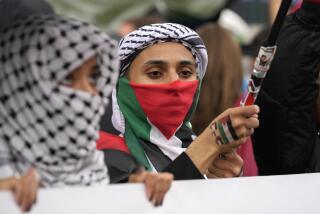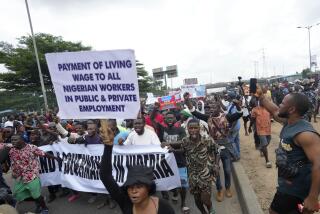Clashes spread across Egypt; more than 60 reported killed
CAIRO -- Clashes between security forces and supporters of the Muslim Brotherhood spread across Egypt on Friday, killing dozens of protesters as gunfire erupted and vigilantes, some brandishing whips and pipes, roamed neighborhoods and cheered soldiers moving through the streets.
Fierce violence broke out as tens of thousands of supporters of deposed Islamist President Mohamed Morsi marched toward Ramses Square in downtown Cairo. Police and men in civilian clothes fired tear gas, birdshot and live bullets as protesters rushed the dead and wounded into a makeshift hospital in a nearby mosque.
Doctors at the hospital said at least 52 protesters had been killed. Media reports said more than 15 others died in clashes that spread to Ismailia, Damietta, Fayoum and other cities. Egypt’s new military-backed government said there were nine confirmed deaths nationwide.
The bloodshed came a day after the Interior Ministry announced police would use “live ammunition in the face” of any attacks. That warning did not deter surges of protesters angry over raids by security forces on two sit-ins Wednesday that killed more than 600 Morsi supporters.
“I have no gun. I have no knife. I only have my body marching here. If I am killed, it is for my freedom,” said Issam Ibrahim, an engineer, as army helicopters buzzed overhead. “Can the military withstand this kind of pressure? I doubt it. It may take days, weeks, but we are marching for legitimacy.”
“You tell the world,” said another man. “You tell the world what we are doing.”
The marches were dubbed the “Day of Rage” and they edged this nation further into chaos.
The military, which overthrew Morsi last month, vowed that it would not relent, and the Brotherhood, seeking to reenergize its base, promised to fill the streets until the former president is returned to power.
But after more than six weeks of unrest, nerves were fraying, even as passions were intensifying over the drawing of battle lines. Pro- and anti-Morsi supporters clashed in some neighborhoods, and churches were attacked by Islamists angry over Coptic Christians’ support for the military.
Car radios crackled with a new song popular among Brotherhood followers: “Egypt Is Islamic.”
Opposing camps marched beneath the posters of their heroes – Morsi for the Brotherhood, and Gen. Abdel Fattah Sisi, commander of the armed forces, for liberals and secularists.
Along these fault lines, vigilantes, as they did in the uprising that overthrew Hosni Mubarak in 2011, returned to many streets, including the corniche along the Nile, where a man with a whip and another with a pipe checked for anyone suspicious.
“We are praying to God, so he can calm things down,” said Nabil Reda, standing behind the locked gates of a mosque. “We are at the peak of the danger now ... It’s not about who’s wrong or right anymore.”
ALSO:
4 bodies found in sunken India submarine as search goes on
At 123, Bolivian man may be the oldest human who ever lived
Yelena Isinbayeva says she was misunderstood on Russia’s anti-gay law
Twitter: @JeffreyLAT
Times staff writer Raja Abdulrahim and special correspondent Ingy Hassieb contributed to this report.
More to Read
Sign up for Essential California
The most important California stories and recommendations in your inbox every morning.
You may occasionally receive promotional content from the Los Angeles Times.











